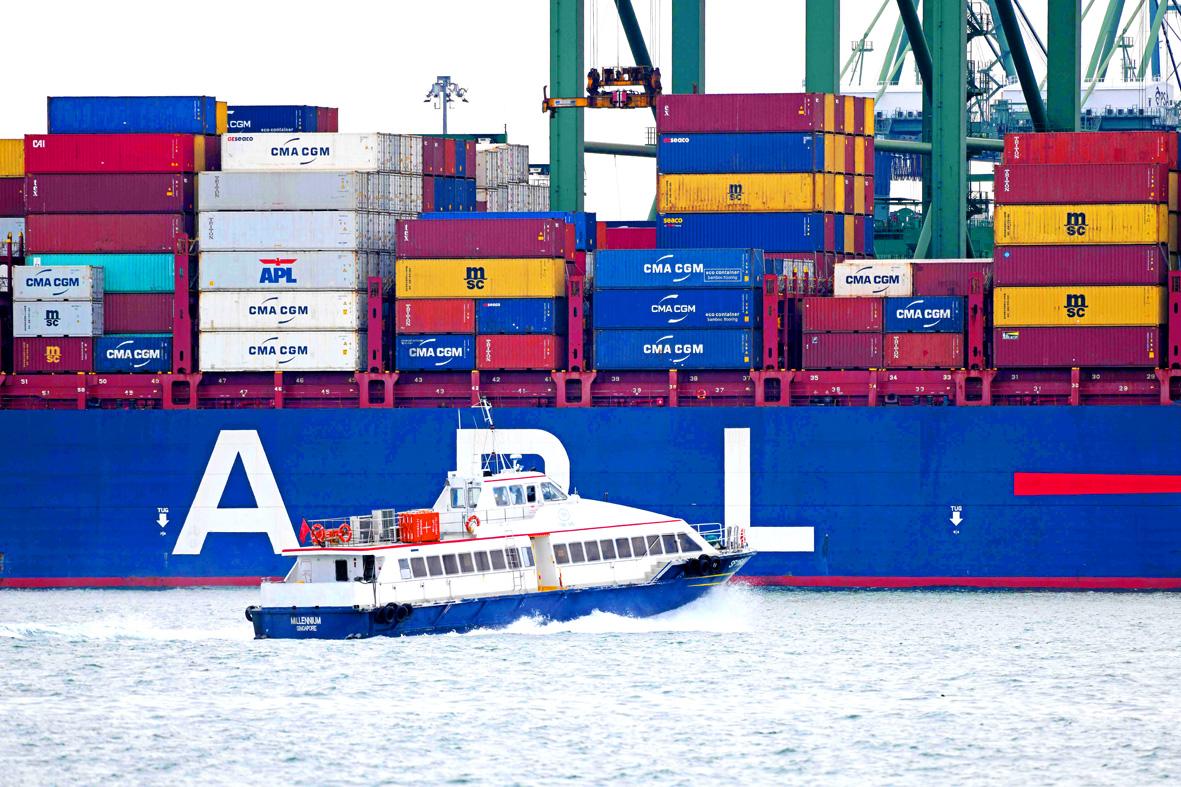Singaporean Deputy Prime Minister Heng Swee Keat (王瑞傑) yesterday announced additional support measures of S$8 billion (US$5.84 billion) to cushion the blow from the COVID-19 pandemic, extending wage subsidies and aiming to shore up the hard-hit aviation and hospitality sectors.
The new set of measures, announced almost three months after the last package, adds to Singapore’s total pledged pandemic aid of almost S$100 billion, Heng, who is also minister of finance, said in a taped speech.
While Singapore has managed to bring virus cases under control, the global economy “remains very weak,” Heng said.

Photo: AFP
“We must continue to adapt to the rapidly changing situation. We designed our measures to give us flexibility for adjustments as the crisis progresses. Some of these measures are ending soon,” he said.
The latest measures would not require any additional use of past reserves beyond what was already approved, Heng said.
Unused expenditures from earlier budgets would help fund the latest measures, allowing the government to narrow the projected budget deficit this fiscal year by S$100 million since the fourth package was announced in May, to S$74.2 billion.
Further support was deemed necessary as the city-state has fallen into a technical recession, retail and hospitality sectors are struggling to recover from months of mobility restrictions, and officials have warned of further retrenchments through year-end.
Singapore’s economy shrank a record 42.9 percent on an annualized basis in the second quarter from the previous three months, data last week showed, with Singaporean Minister for Trade and Industry Chan Chun Sing (陳振聲) warning there could be “recurring waves of infection and disruption.”
Export figures released yesterday showed tentative signs of recovery in July, with non-oil domestic shipments jumping 6 percent from the same time last year, beating estimates for a second straight month.

Semiconductor shares in China surged yesterday after Reuters reported the US had ordered chipmaking giant Taiwan Semiconductor Manufacturing Co (TSMC, 台積電) to halt shipments of advanced chips to Chinese customers, which investors believe could accelerate Beijing’s self-reliance efforts. TSMC yesterday started to suspend shipments of certain sophisticated chips to some Chinese clients after receiving a letter from the US Department of Commerce imposing export restrictions on those products, Reuters reported on Sunday, citing an unnamed source. The US imposed export restrictions on TSMC’s 7-nanometer or more advanced designs, Reuters reported. Investors figured that would encourage authorities to support China’s industry and bought shares

TECH WAR CONTINUES: The suspension of TSMC AI chips and GPUs would be a heavy blow to China’s chip designers and would affect its competitive edge Taiwan Semiconductor Manufacturing Co (TSMC, 台積電), the world’s biggest contract chipmaker, is reportedly to halt supply of artificial intelligence (AI) chips and graphics processing units (GPUs) made on 7-nanometer or more advanced process technologies from next week in order to comply with US Department of Commerce rules. TSMC has sent e-mails to its Chinese AI customers, informing them about the suspension starting on Monday, Chinese online news outlet Ijiwei.com (愛集微) reported yesterday. The US Department of Commerce has not formally unveiled further semiconductor measures against China yet. “TSMC does not comment on market rumors. TSMC is a law-abiding company and we are

FLEXIBLE: Taiwan can develop its own ground station equipment, and has highly competitive manufacturers and suppliers with diversified production, the MOEA said The Ministry of Economic Affairs (MOEA) yesterday disputed reports that suppliers to US-based Space Exploration Technologies Corp (SpaceX) had been asked to move production out of Taiwan. Reuters had reported on Tuesday last week that Elon Musk-owned SpaceX had asked their manufacturers to produce outside of Taiwan given geopolitical risks and that at least one Taiwanese supplier had been pushed to relocate production to Vietnam. SpaceX’s requests place a renewed focus on the contentious relationship Musk has had with Taiwan, especially after he said last year that Taiwan is an “integral part” of China, sparking sharp criticism from Taiwanese authorities. The ministry said

US President Joe Biden’s administration is racing to complete CHIPS and Science Act agreements with companies such as Intel Corp and Samsung Electronics Co, aiming to shore up one of its signature initiatives before US president-elect Donald Trump enters the White House. The US Department of Commerce has allocated more than 90 percent of the US$39 billion in grants under the act, a landmark law enacted in 2022 designed to rebuild the domestic chip industry. However, the agency has only announced one binding agreement so far. The next two months would prove critical for more than 20 companies still in the process